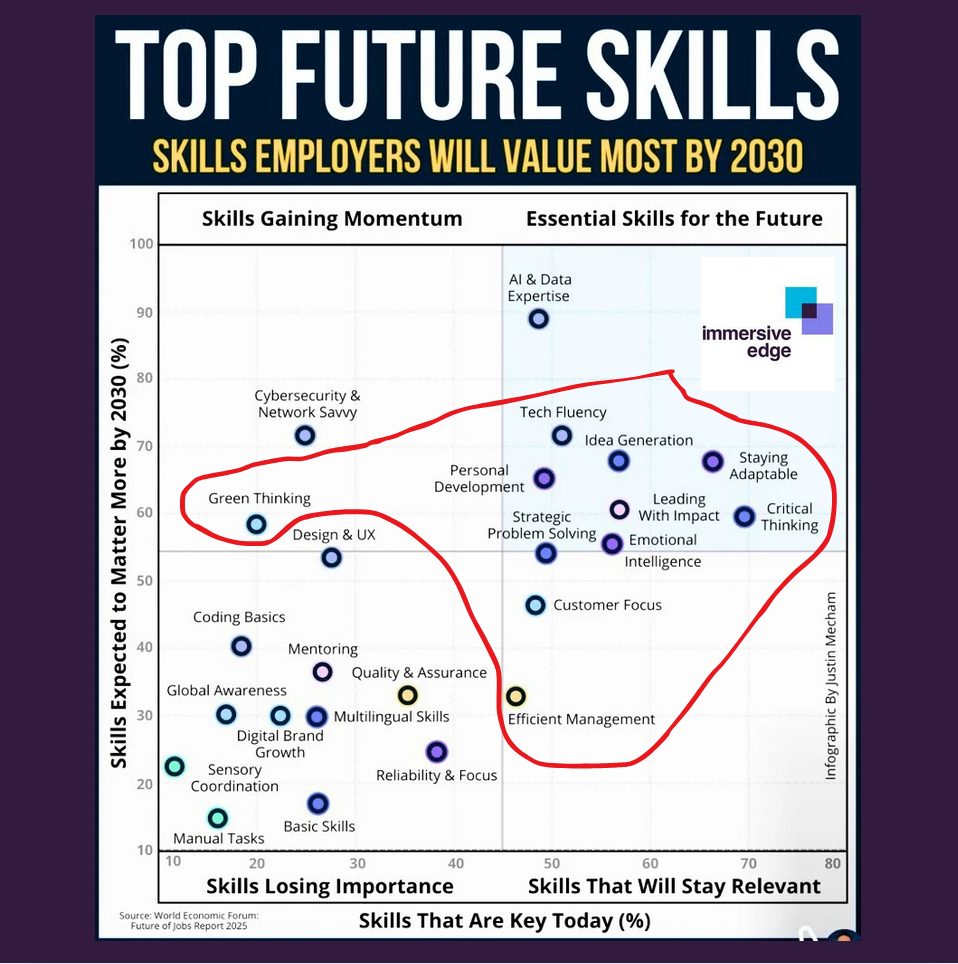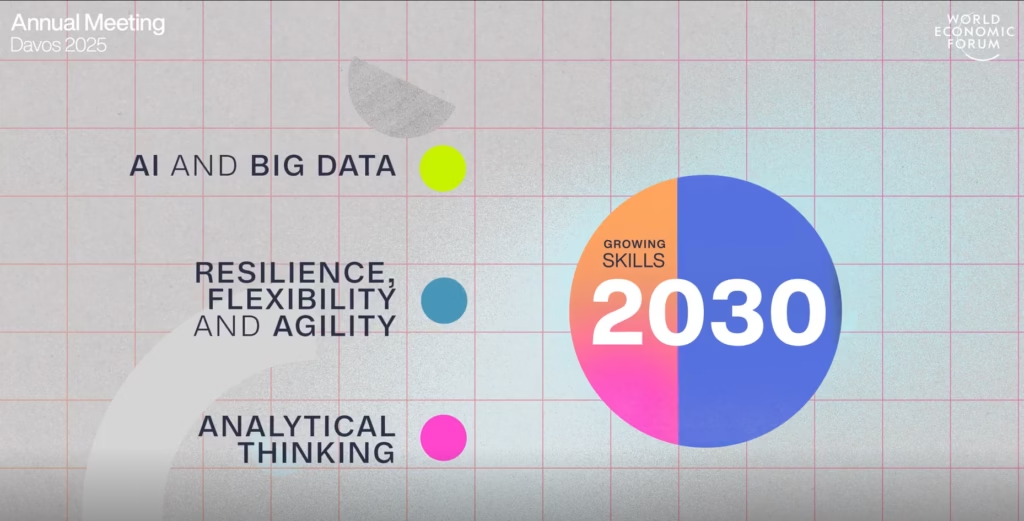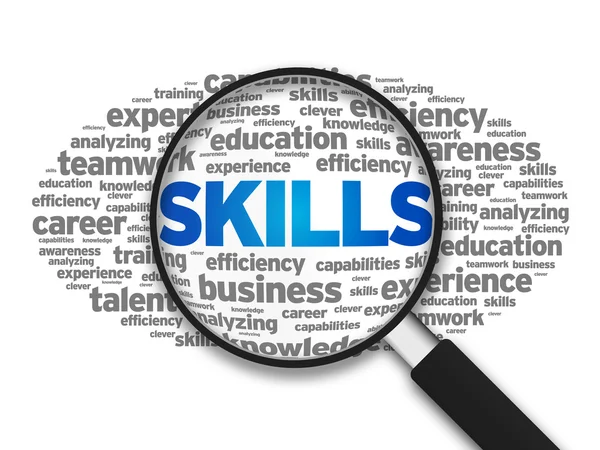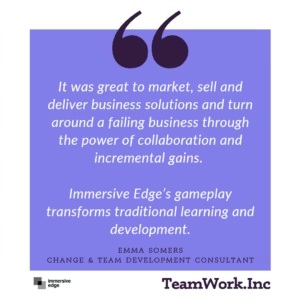“We complain that learners want to be spoon-fed, but then we won’t let them hold the spoon.“
Jane Bozarth – Director of Research, The Learning Guild
The future belongs to those who prepare for it today. Whilst studying at university, learners are actively encouraged to focus not just on what’s required now, but on the skills that will shape the industries of tomorrow such as adaptability, critical thinking, and the ability to harness technology. Employers don’t just seek degrees; they seek minds that are ready to evolve.
There might be nothing seemingly groundbreaking and new in those words, but of course as times change and evolve, so do the skills that will stay relevant to employers in the future, with a certain inevitability around skills that may expect to lose importance and relevance in the global job market.
In today’s competitive job market, employers are not just looking for candidates with impressive resumes; they are seeking individuals who possess a diverse set of skills that go beyond technical expertise. Below are some of the most valued skills identified in the World Economic Forum’s Future of Jobs Report 2025 that are considered to “matter more” in the next five years, with the red boundary line capturing within it the skills which can be directly honed, developed, fostered and harnessed through the power of Immersive Edge business simulations online and in-person:

Skills Employers Value Most in Today’s Job Market
Further explored in the WEF Annual Meeting at Davos in 2025, which you can read more about and download here, let’s look in particular at what those skills actually mean, how they may simply be defined, and why it matters in the context of global approaches to education, learning and development in both public and private sectors.

1) Tech Fluency
In an increasingly digital world, understanding technology is no longer optional. Tech fluency refers to the ability to navigate and leverage digital tools, software, and emerging technologies effectively. Whether it’s AI, cloud computing, automation, or cybersecurity, professionals with strong tech fluency can integrate technology seamlessly into their work, improving efficiency and staying ahead of industry trends.
2) Idea Generation
Creativity and innovation drive progress. Idea generation involves thinking outside the box, challenging conventional methods, and bringing fresh perspectives to problem-solving. Employees who can contribute new ideas and experiment with novel approaches add immense value to organizations, leading to growth and continuous improvement.
3) Staying Adaptable
With industries constantly evolving due to technological advancements and market changes, adaptability is a critical skill. Being adaptable means embracing change, learning new skills as needed, and remaining flexible in uncertain environments. Professionals who can quickly adjust to shifting priorities and challenges are more resilient and effective in dynamic workplaces.
4) Leading with Impact
Leadership is not just about holding a title—it’s about influence, vision, and inspiring others. Effective leaders foster collaboration, communicate with clarity, and drive positive change. Leading with impact means making decisions that align with long-term goals while motivating teams to achieve success.
5) Emotional Intelligence
Emotional intelligence (EQ) is the ability to recognize, understand, and manage emotions—both in oneself and in others. High EQ contributes to better workplace relationships, conflict resolution, and team dynamics. Leaders and employees with strong emotional intelligence create a positive work environment, enhancing collaboration and overall productivity.
6) AI & Data Expertise
Artificial intelligence and data-driven decision-making are transforming industries. Understanding AI applications, machine learning, and data analytics allows professionals to leverage insights, optimize processes, and create innovative solutions. In a world driven by data, those who can interpret and use information effectively hold a significant competitive advantage.
7) Critical Thinking
Critical thinking involves analyzing information objectively, questioning assumptions, and making well-informed decisions. In an era of misinformation and rapid change, professionals who can assess complex situations logically and independently are invaluable assets to any organization.
8) Strategic Problem-Solving
Problem-solving is more than just finding quick fixes—it’s about identifying root causes and developing long-term strategies. Strategic problem-solving involves looking at challenges holistically, considering multiple factors, and implementing solutions that align with broader business objectives.
9) Personal Development
Continuous learning and self-improvement are key to long-term success. Personal development encompasses acquiring new skills, seeking feedback, and striving for professional growth. Those who invest in lifelong learning remain adaptable, relevant, and ready for new opportunities.
10) Green Thinking
Sustainability is a growing priority across industries. Green thinking involves making environmentally conscious decisions, promoting sustainable practices, and integrating eco-friendly strategies into business operations. Companies increasingly value employees who understand the importance of sustainability and can contribute to corporate social responsibility initiatives.
Future of Education and Skills 2030/2040
The Organisation for Economic Co-operation and Development (OECD) takes it on a decade to 2040. They are an international organisation that works to build better policies for better lives with more than 60 years of experience and insights to shape policies that foster prosperity and opportunity, underpinned by equality and well-being.
Working closely with policy makers, stakeholders and citizens to establish evidence-based international standards and to find solutions to social, economic and environmental challenges, their core aim is to set international standards and support their implementation – and help countries forge a path towards stronger, fairer and cleaner societies.
Taking an approach that analyzes two strands (Learning & Teaching for 2030, & International Curriculum Analysis), the OECD interrogates the following;
- How can we seek to prepare students for jobs that have not yet been created?
- How can we tackle societal challenges that we can’t yet imagine?
- How may we use technologies that have not yet been invented?
- How can we equip today’s students to thrive in an interconnected world where they need to understand and appreciate different perspectives and world views, whilst interacting respectfully with others?
- How do we take responsible action towards sustainability and collective well-being?

It serves to offer a broad vision of what students will need to thrive in 2030 and beyond, e.g. student agency, student well-being, and the types of competencies (knowledge, skills, attitudes, and values). It is globally informed, to be locally contextualized.
The Vital Role of Experiential Learning
Experiential learning will continue to play a crucial role in developing the widely acknowledged and identified skills needed for the future by bridging the gap between theoretical knowledge and real-world application.
Through internships, hands-on projects, simulations, and industry collaborations, students gain practical experience that enhances their problem-solving abilities, adaptability, and critical thinking.
This immersive approach fosters tech fluency, teamwork, and leadership by placing individuals in dynamic, real-world scenarios where they must apply their skills in a meaningful way.
As industries continue to evolve, experiential learning ensures that learners are not just absorbing information but actively engaging with challenges, making them more prepared for the demands of the future workplace.
Elton Daddow has been working in the field of Higher Education for over 20 years, 13 of which were spent in Higher and Further Education partnership roles at FTSE100 Pearson in the UK through their digital transformation journey from print publisher to becoming the leading digital content and assessment provider in the education sector.
He is passionate about embedding technology-enhanced learning solutions and initiatives into CPD and teaching and learning strategy to support broad strategic goals for public and private sector clients.
Elton now works in a global role as Commercial & Training Director at Immersive Edge, delivering experiential learning business simulations with clearly defined learning outcomes that surface and tackle common business challenges in a safe space, using advanced game technology, experiential learning, and behavioral dynamics to increase retention, support core skills development and create lasting connections.




